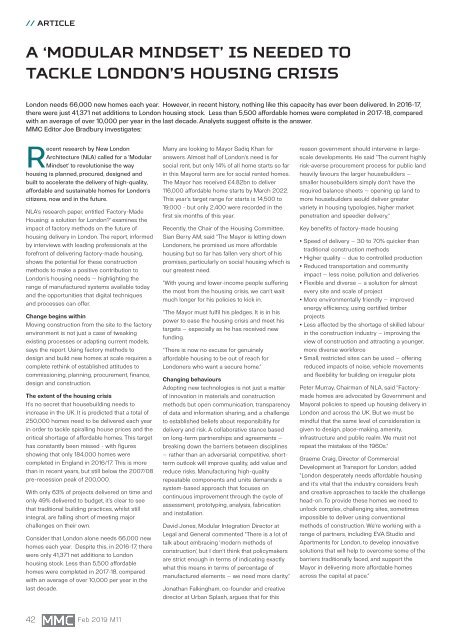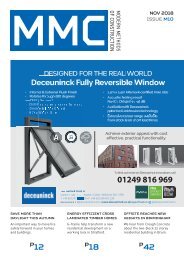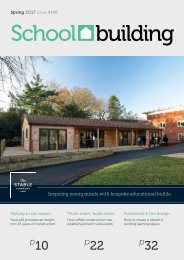a.aa MMC M11 52pp Web
You also want an ePaper? Increase the reach of your titles
YUMPU automatically turns print PDFs into web optimized ePapers that Google loves.
article<br />
A ‘modular mindset’ is needed to<br />
tackle London’s housing crisis<br />
London needs 66,000 new homes each year. However, in recent history, nothing like this capacity has ever been delivered. In 2016-17,<br />
there were just 41,371 net additions to London housing stock. Less than 5,500 affordable homes were completed in 2017-18, compared<br />
with an average of over 10,000 per year in the last decade. Analysts suggest offsite is the answer.<br />
<strong>MMC</strong> Editor Joe Bradbury investigates:<br />
Recent research by New London<br />
Architecture (NLA) called for a ‘Modular<br />
Mindset’ to revolutionise the way<br />
housing is planned, procured, designed and<br />
built to accelerate the delivery of high-quality,<br />
affordable and sustainable homes for London’s<br />
citizens, now and in the future.<br />
NLA’s research paper, entitled ‘Factory-Made<br />
Housing: a solution for London?’ examines the<br />
impact of factory methods on the future of<br />
housing delivery in London. The report, informed<br />
by interviews with leading professionals at the<br />
forefront of delivering factory-made housing,<br />
shows the potential for these construction<br />
methods to make a positive contribution to<br />
London’s housing needs – highlighting the<br />
range of manufactured systems available today<br />
and the opportunities that digital techniques<br />
and processes can offer.<br />
Change begins within<br />
Moving construction from the site to the factory<br />
environment is not just a case of tweaking<br />
existing processes or adapting current models,<br />
says the report. Using factory methods to<br />
design and build new homes at scale requires a<br />
complete rethink of established attitudes to<br />
commissioning, planning, procurement, finance,<br />
design and construction.<br />
The extent of the housing crisis<br />
It’s no secret that housebuilding needs to<br />
increase in the UK. It is predicted that a total of<br />
250,000 homes need to be delivered each year<br />
in order to tackle spiralling house prices and the<br />
critical shortage of affordable homes. This target<br />
has constantly been missed - with figures<br />
showing that only 184,000 homes were<br />
completed in England in 2016/17. This is more<br />
than in recent years, but still below the 2007/08<br />
pre-recession peak of 200,000.<br />
With only 63% of projects delivered on time and<br />
only 49% delivered to budget, it’s clear to see<br />
that traditional building practices, whilst still<br />
integral, are falling short of meeting major<br />
challenges on their own.<br />
Consider that London alone needs 66,000 new<br />
homes each year. Despite this, in 2016-17, there<br />
were only 41,371 net additions to London<br />
housing stock. Less than 5,500 affordable<br />
homes were completed in 2017-18, compared<br />
with an average of over 10,000 per year in the<br />
last decade.<br />
Many are looking to Mayor Sadiq Khan for<br />
answers. Almost half of London’s need is for<br />
social rent, but only 14% of all home starts so far<br />
in this Mayoral term are for social rented homes.<br />
The Mayor has received £4.82bn to deliver<br />
116,000 affordable home starts by March 2022.<br />
This year’s target range for starts is 14,500 to<br />
19,000 - but only 2,400 were recorded in the<br />
first six months of this year.<br />
Recently, the Chair of the Housing Committee,<br />
Sian Berry AM, said “The Mayor is letting down<br />
Londoners, he promised us more affordable<br />
housing but so far has fallen very short of his<br />
promises, particularly on social housing which is<br />
our greatest need.<br />
“With young and lower-income people suffering<br />
the most from the housing crisis, we can’t wait<br />
much longer for his policies to kick in.<br />
“The Mayor must fulfil his pledges. It is in his<br />
power to ease the housing crisis and meet his<br />
targets – especially as he has received new<br />
funding.<br />
“There is now no excuse for genuinely<br />
affordable housing to be out of reach for<br />
Londoners who want a secure home.”<br />
Changing behaviours<br />
Adopting new technologies is not just a matter<br />
of innovation in materials and construction<br />
methods but open communication, transparency<br />
of data and information sharing, and a challenge<br />
to established beliefs about responsibility for<br />
delivery and risk. A collaborative stance based<br />
on long-term partnerships and agreements –<br />
breaking down the barriers between disciplines<br />
– rather than an adversarial, competitive, shortterm<br />
outlook will improve quality, add value and<br />
reduce risks. Manufacturing high-quality<br />
repeatable components and units demands a<br />
system-based approach that focuses on<br />
continuous improvement through the cycle of<br />
assessment, prototyping, analysis, fabrication<br />
and installation.<br />
David Jones, Modular Integration Director at<br />
Legal and General commented “There is a lot of<br />
talk about embracing ‘modern methods of<br />
construction’, but I don’t think that policymakers<br />
are strict enough in terms of indicating exactly<br />
what this means in terms of percentage of<br />
manufactured elements – we need more clarity.”<br />
Jonathan Falkingham, co-founder and creative<br />
director at Urban Splash, argues that for this<br />
reason government should intervene in largescale<br />
developments. He said “The current highly<br />
risk-averse procurement process for public land<br />
heavily favours the larger housebuilders –<br />
smaller housebuilders simply don’t have the<br />
required balance sheets – opening up land to<br />
more housebuilders would deliver greater<br />
variety in housing typologies, higher market<br />
penetration and speedier delivery.”<br />
Key benefits of factory-made housing<br />
• Speed of delivery – 30 to 70% quicker than<br />
traditional construction methods<br />
• Higher quality – due to controlled production<br />
• Reduced transportation and community<br />
impact – less noise, pollution and deliveries<br />
• Flexible and diverse – a solution for almost<br />
every site and scale of project<br />
• More environmentally friendly – improved<br />
energy efficiency, using certified timber<br />
projects<br />
• Less affected by the shortage of skilled labour<br />
in the construction industry – improving the<br />
view of construction and attracting a younger,<br />
more diverse workforce<br />
• Small, restricted sites can be used – offering<br />
reduced impacts of noise, vehicle movements<br />
and flexibility for building on irregular plots<br />
Peter Murray, Chairman of NLA, said “Factorymade<br />
homes are advocated by Government and<br />
Mayoral policies to speed up housing delivery in<br />
London and across the UK. But we must be<br />
mindful that the same level of consideration is<br />
given to design, place-making, amenity,<br />
infrastructure and public realm. We must not<br />
repeat the mistakes of the 1960s.”<br />
Graeme Craig, Director of Commercial<br />
Development at Transport for London, added<br />
“London desperately needs affordable housing<br />
and it’s vital that the industry considers fresh<br />
and creative approaches to tackle the challenge<br />
head-on. To provide these homes we need to<br />
unlock complex, challenging sites, sometimes<br />
impossible to deliver using conventional<br />
methods of construction. We’re working with a<br />
range of partners, including EVA Studio and<br />
Apartments for London, to develop innovative<br />
solutions that will help to overcome some of the<br />
barriers traditionally faced, and support the<br />
Mayor in delivering more affordable homes<br />
across the capital at pace.”<br />
42 Feb 2019 <strong>M11</strong>
















